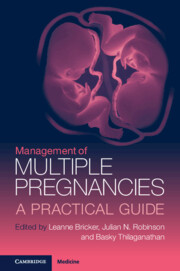Book contents
- Management of Multiple Pregnancies
- Management of Multiple Pregnancies
- Copyright page
- Contents
- Editors
- Contributors
- Chapter 1 Epidemiology of Multiple Pregnancy
- Chapter 2 Assisted Conception and Multiple Pregnancy
- Chapter 3 Zygosity, Chorionicity and Amnionicity
- Chapter 4 Multifetal Pregnancy Reduction
- Chapter 5 Gestational Dating in Multiple Pregnancy
- Chapter 6 Screening for Fetal Aneuploidy in Multiple Pregnancy
- Chapter 7 Screening for Fetal Abnormality in Multiple Pregnancy
- Chapter 8 Screening and Diagnosis of Complications of Shared Placentation
- Chapter 9 Invasive Prenatal Diagnosis in Multiple Pregnancy
- Chapter 10 Conjoined Twinning
- Chapter 11 Management of Discordant Fetal Anomaly
- Chapter 12 Single and Double Fetal Loss in Twin Pregnancy
- Chapter 13 Management of Twin–Twin Transfusion Syndrome
- Chapter 14 Management of Twin Anaemia-Polycythaemia Sequence
- Chapter 15 Management of Twin-Reversed Arterial Perfusion (TRAP) Sequence
- Chapter 16 Management of Fetal Growth Pathology in Multiple Pregnancy
- Chapter 17 Management of Monoamniotic Twins
- Chapter 18 Maternal Complications in Multiple Pregnancy
- Chapter 19 Risk Assessment and Screening for Preterm Birth in Multiple Pregnancy
- Chapter 20 Prevention of Preterm Birth in Multiple Pregnancies
- Chapter 21 Optimal Antenatal Care in Multiple Pregnancy
- Chapter 22 Triplet and Higher-Order Pregnancy
- Chapter 23 Timing of Delivery in Multiple Pregnancy
- Chapter 24 Mode of Delivery in Multiple Pregnancy
- Chapter 25 Practical Management of Vaginal Delivery in Multiple Pregnancy
- Chapter 26 Neonatal Care Aspects of Multiple Pregnancy
- Chapter 27 Lifestyle Considerations for Multiple Pregnancy
- Chapter 28 Emotional and Mental Well-Being in Multiple Pregnancy
- Chapter 29 New Frontiers in Multiple Pregnancy Management
- Chapter 30 Multiple Pregnancy Resources for Professionals and the Public
- Chapter 31 Obstetric Anaesthesia in Multiple Pregnancy
- Index
- Plate Section (PDF Only)
- References
Chapter 18 - Maternal Complications in Multiple Pregnancy
Published online by Cambridge University Press: 11 October 2022
- Management of Multiple Pregnancies
- Management of Multiple Pregnancies
- Copyright page
- Contents
- Editors
- Contributors
- Chapter 1 Epidemiology of Multiple Pregnancy
- Chapter 2 Assisted Conception and Multiple Pregnancy
- Chapter 3 Zygosity, Chorionicity and Amnionicity
- Chapter 4 Multifetal Pregnancy Reduction
- Chapter 5 Gestational Dating in Multiple Pregnancy
- Chapter 6 Screening for Fetal Aneuploidy in Multiple Pregnancy
- Chapter 7 Screening for Fetal Abnormality in Multiple Pregnancy
- Chapter 8 Screening and Diagnosis of Complications of Shared Placentation
- Chapter 9 Invasive Prenatal Diagnosis in Multiple Pregnancy
- Chapter 10 Conjoined Twinning
- Chapter 11 Management of Discordant Fetal Anomaly
- Chapter 12 Single and Double Fetal Loss in Twin Pregnancy
- Chapter 13 Management of Twin–Twin Transfusion Syndrome
- Chapter 14 Management of Twin Anaemia-Polycythaemia Sequence
- Chapter 15 Management of Twin-Reversed Arterial Perfusion (TRAP) Sequence
- Chapter 16 Management of Fetal Growth Pathology in Multiple Pregnancy
- Chapter 17 Management of Monoamniotic Twins
- Chapter 18 Maternal Complications in Multiple Pregnancy
- Chapter 19 Risk Assessment and Screening for Preterm Birth in Multiple Pregnancy
- Chapter 20 Prevention of Preterm Birth in Multiple Pregnancies
- Chapter 21 Optimal Antenatal Care in Multiple Pregnancy
- Chapter 22 Triplet and Higher-Order Pregnancy
- Chapter 23 Timing of Delivery in Multiple Pregnancy
- Chapter 24 Mode of Delivery in Multiple Pregnancy
- Chapter 25 Practical Management of Vaginal Delivery in Multiple Pregnancy
- Chapter 26 Neonatal Care Aspects of Multiple Pregnancy
- Chapter 27 Lifestyle Considerations for Multiple Pregnancy
- Chapter 28 Emotional and Mental Well-Being in Multiple Pregnancy
- Chapter 29 New Frontiers in Multiple Pregnancy Management
- Chapter 30 Multiple Pregnancy Resources for Professionals and the Public
- Chapter 31 Obstetric Anaesthesia in Multiple Pregnancy
- Index
- Plate Section (PDF Only)
- References
Summary
Epidemiologic studies consistently demonstrate an increased risk of severe maternal morbidity and mortality in multiple as opposed to singleton pregnancies. The exaggerated cardiovascular adaptation required to support more than one fetus may explain some of this morbidity while incorporating physiology into clinical management decisions may mitigate some of the risk. Balancing maternal risk with neonatal outcomes is central to obstetric management decisions including delivery timing and mode of delivery. Encouraging vaginal birth for women with cephalic-presenting first twins may reduce the risk of maternal morbidity but requires the involvement of an obstetrician with comfort with twin vaginal birth including breech extraction. Dedicated attention to maternal psychosocial state—particularly in the postpartum period—is an essential component of optimizing maternal outcomes in multifetal pregnancies. A uniform approach to management followed by tailored risk-appropriate care as clinical complexities arise is essential to optimize maternal outcomes in multifetal pregnancy.
- Type
- Chapter
- Information
- Management of Multiple PregnanciesA Practical Guide, pp. 188 - 200Publisher: Cambridge University PressPrint publication year: 2022



